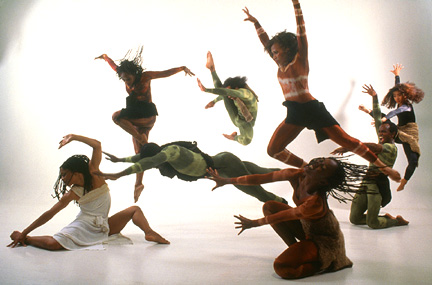
Earth Song
Listen to things more often
than beings.
Hear the voice of the fire, hear the voice of the
water,
Listen in the wind to the sighing of the bush:
This is the
ancestors breathing.
Those who are dead are never gone;
The dead are not
down in the earth:
They are in the trembling of the trees,
In the groaning
of the woods,
In the water that runs, in the water that sleeps,
They are
in the hut, they are in the crowd.
Those who are dead are not ever
gone;
They are in the woman's breast, they are in the wailing of a
child,
They are in the burning log and in the moaning rock.
They are in
the weeping grasses, in the forest and the home.
Listen to things more often
than beings.
Hear the voice of fire, hear the voice of water.
Listen in
the wind to the sighing of the bush.
This is the ancestors breathing.
than beings.
Hear the voice of the fire, hear the voice of the
water,
Listen in the wind to the sighing of the bush:
This is the
ancestors breathing.
Those who are dead are never gone;
The dead are not
down in the earth:
They are in the trembling of the trees,
In the groaning
of the woods,
In the water that runs, in the water that sleeps,
They are
in the hut, they are in the crowd.
Those who are dead are not ever
gone;
They are in the woman's breast, they are in the wailing of a
child,
They are in the burning log and in the moaning rock.
They are in
the weeping grasses, in the forest and the home.
Listen to things more often
than beings.
Hear the voice of fire, hear the voice of water.
Listen in
the wind to the sighing of the bush.
This is the ancestors breathing.
(Traditional from Senegal,
translator unknown)
translator unknown)
Web archive of Panhala postings: www.panhala.net/Archive/Index.html
HISTORY
Archaeological findings throughout the
area indicate that Senegal was inhabited in prehistoric times. Islam
established itself in the Senegal River valley in the 11th century; 95%
of Senegalese today are Muslims. In the 13th and 14th centuries, the
area came under the influence of the Mandingo empires to the east; the
Jolof Empire of Senegal also was founded during this time.
In
January 1959, Senegal and the French Soudan merged to form the Mali
Federation, which became fully independent on June 20, 1960, as a
result of the independence and the transfer of power agreement signed
with France on April 4, 1960. Due to internal political difficulties,
the Federation broke up on August 20, 1960. Senegal and Soudan (renamed
the Republic of Mali) proclaimed independence. Leopold Sedar Senghor,
internationally known poet, politician, and statesman, was elected
Senegal's first President in August 1960.
After the breakup of
the Mali Federation, President Senghor and Prime Minister Mamadou Dia
governed together under a parliamentary system. In December 1962, their
political rivalry led to an attempted coup by Prime Minister Dia.
Although this was put down without bloodshed, Dia was arrested and
imprisoned, and Senegal adopted a new constitution that consolidated
the President’s power. In 1980, President Senghor decided to retire
from politics, and he handed over power in 1981 to his handpicked
successor, Abdou Diouf.
Abdou Diouf was President from 1981-2000. He
encouraged broader political participation, reduced government
involvement in the economy, and widened Senegal's diplomatic
engagements, particularly with other developing nations. Domestic
politics on occasion spilled over into street violence, border
tensions, and a violent separatist movement in the southern region of
the Casamance. Nevertheless, Senegal's commitment to democracy and
human rights strengthened.
Diouf served four terms as President. In the
presidential election of 2000, he was defeated, in a free and fair
election, by opposition leader Abdoulaye Wade.
Senegal experienced its
second peaceful transition of power, and its first from one political
party to another. Parliamentary and presidential elections were held in
2007.
https://www.state.gov/r/pa/ei/bgn/2862.htm
iNTRODUCING...SENEGAL: The Land of Teranga ("Hospitality") - Part III

Music and Dance (especially street sabar) are the main forms of
entertainment which bring together the people of Senegal to practice
our culture and to establich a stronger sense of community.The biggest musical artist, from the time before my parents were even
born - which is a long time (around the late 1950s to early 60s), is
Youssou Ndour.

He is considered the ambassador of Africa (even by non-senegalese
people) because his music speaks to the current issues affecting the
continent. He even organizes events for certain causes such as "Africa
Live" which was an event for fighting against malaria, which is one the
main cause of death now in Africa. To contribute to the bond of unity
between Africans, he performs all over the world. He even came to the
University of Michigan for the past few years to perform at the Hill
Auditorium. But the biggest event he puts on is: BERCY. Every year, he
performs in Bercy, France, where thousands and thousands of Africans
from every corner of the world gather to celebrate our culture for an
ever-lasting night. To get a feel of some of the energy at the event,
you can watch the following youtube video[you can watch more from that
page - warning: you may get addicted because he has such a serene
voice. :) ]:
https://www.youtube.com/watch?v=1qL3QFEC4-k
You'll also see some dancers in the clip above. But there are so many
videos on Youtube you can watch to get a sense of senegalese dancing
which is very VERY energetic and follows/goes with the music literally
(which you can see from the guy dancing - his name is Papa Ndiaye; he
is well known in Senegal as one of the best dancers). There are also
woman dancers in the other clips on YouTube. Youssou has his own
personal site if you want to read about his biography, global awards,
etc:
https://www.youssou.com/
: mblog.lib.umich.edu/%7Eyayeab


